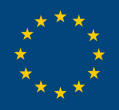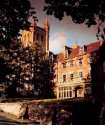Resources within the department
 We
have exclusive use every year of a native speaker foreign
language assistant in both French and German, and they
and the native speakers among our permanent staff represent
an invaluable resource within the department in terms
of authenticity, current affairs and cultural awareness.
The assistants work with pupils across all years. In
addition to the conventional use of audio tape material,
current language learning involves many other resources.
ICT now represents a significant part of language learning,
and pupils have opportunities to learn from interactive
websites, power point presentations, CD Roms and special
language learning We
have exclusive use every year of a native speaker foreign
language assistant in both French and German, and they
and the native speakers among our permanent staff represent
an invaluable resource within the department in terms
of authenticity, current affairs and cultural awareness.
The assistants work with pupils across all years. In
addition to the conventional use of audio tape material,
current language learning involves many other resources.
ICT now represents a significant part of language learning,
and pupils have opportunities to learn from interactive
websites, power point presentations, CD Roms and special
language learning  programs
such as Fun With Texts. All classrooms are equipped
with TV/video facilities, and the department also has
satellite TV; we also have a vast bank of videos, of
films and documentaries, for use with all years. It
is a particularly useful resource for A-level, as we
have many videos that tie in with the topic based approach
in those years. We can also offer subscriptions to
magazines, published in the target language and pitched
at the correct level. programs
such as Fun With Texts. All classrooms are equipped
with TV/video facilities, and the department also has
satellite TV; we also have a vast bank of videos, of
films and documentaries, for use with all years. It
is a particularly useful resource for A-level, as we
have many videos that tie in with the topic based approach
in those years. We can also offer subscriptions to
magazines, published in the target language and pitched
at the correct level.
Years 7 - 9
 French
and German are taught in mixed ability groups. The
emphasis is on both communication AND accuracy, and
grammar is taught right from the start. Pupils enjoy
a wide variety of learning media, as well as the main
course textbook, and assessment takes place in the
form of ongoing tests and an end-of-year exam. Constant
monitoring takes place to ensure that pupils’ strengths
and weaknesses are spotted across the four skill areas
of listening, speaking, reading and writing. To cater
for our bilingual pupils, or pupils who have limited
experience of languages, we run special classes tailored
to meet their needs, using the native speakers within
the department. All in all, pupils in the lower school
can look forward to a varied, challenging and enjoyable
initiation to foreign languages. French
and German are taught in mixed ability groups. The
emphasis is on both communication AND accuracy, and
grammar is taught right from the start. Pupils enjoy
a wide variety of learning media, as well as the main
course textbook, and assessment takes place in the
form of ongoing tests and an end-of-year exam. Constant
monitoring takes place to ensure that pupils’ strengths
and weaknesses are spotted across the four skill areas
of listening, speaking, reading and writing. To cater
for our bilingual pupils, or pupils who have limited
experience of languages, we run special classes tailored
to meet their needs, using the native speakers within
the department. All in all, pupils in the lower school
can look forward to a varied, challenging and enjoyable
initiation to foreign languages.
Years 10 and 11
 Setting
takes place at the end of Year 9 and pupils go into
their GCSE modern language(s) in smaller groups. The
course content and textbooks aim to prepare pupils
thoroughly for GCSE and beyond by offering more profound
insights into the languages and their grammar, and
include more advanced facets of languages learning,
such as idiom. The written component of Year 11 is
coursework, enabling pupils to write more personal,
creative pieces of work. Here and in their oral preparation,
pupils extend their knowledge and application of the
language beyond the confines of GCSE. Setting
takes place at the end of Year 9 and pupils go into
their GCSE modern language(s) in smaller groups. The
course content and textbooks aim to prepare pupils
thoroughly for GCSE and beyond by offering more profound
insights into the languages and their grammar, and
include more advanced facets of languages learning,
such as idiom. The written component of Year 11 is
coursework, enabling pupils to write more personal,
creative pieces of work. Here and in their oral preparation,
pupils extend their knowledge and application of the
language beyond the confines of GCSE.
A Level
 Students
in the sixth form can look forward to the challenge
of pursuing languages at A Level through a variety
of topic areas, such as Young People Today, Rights and Responsibilities, Jobs and Careers.
Not only do these topics offer interesting and profound
contexts within which advanced language learning can
take place, they also are conceived with young adults
in mind. The A-level student can look forward not only
to unlimited access to all the resources available
in the department, but also to language open days at
universities, visits to films and plays, language lectures
and of course, trips abroad. (See below) Students
in the sixth form can look forward to the challenge
of pursuing languages at A Level through a variety
of topic areas, such as Young People Today, Rights and Responsibilities, Jobs and Careers.
Not only do these topics offer interesting and profound
contexts within which advanced language learning can
take place, they also are conceived with young adults
in mind. The A-level student can look forward not only
to unlimited access to all the resources available
in the department, but also to language open days at
universities, visits to films and plays, language lectures
and of course, trips abroad. (See below)
Languages beyond A Level
 Owing
to the increasing importance of fluency in a foreign
language, many University and further education courses
involve a modern language. Examples include Management
with German and Computer studies with French. Many
students, on completion of these courses, comment how
glad they were that they pursued a foreign language
to degree level. Equally, many who don’t are
often left disappointed later in life and take up languages
again in their thirties, starting almost from scratch
once again. Exchanges / Trips Owing
to the increasing importance of fluency in a foreign
language, many University and further education courses
involve a modern language. Examples include Management
with German and Computer studies with French. Many
students, on completion of these courses, comment how
glad they were that they pursued a foreign language
to degree level. Equally, many who don’t are
often left disappointed later in life and take up languages
again in their thirties, starting almost from scratch
once again. Exchanges / Trips
Exchanges / Trips
 We
have several established links with schools and other
organisations abroad. For the lower school, a trip
to Normandy exists, which has proven to be most enjoyable
and profitable to all concerned. We also use the Bristol
/ Bordeaux twinning, and pupils from throughout the
school can take advantage of this exchange. A combined
languages and geography trip to the Alps also happens. We
have several established links with schools and other
organisations abroad. For the lower school, a trip
to Normandy exists, which has proven to be most enjoyable
and profitable to all concerned. We also use the Bristol
/ Bordeaux twinning, and pupils from throughout the
school can take advantage of this exchange. A combined
languages and geography trip to the Alps also happens.
We are currently investigating new opportunities
in terms of German, including a lower school visit
to German Christmas markets and a possible middle-school
exchange. For further information, please do not hesitate
to contact the Faculty!
Bonne chance!
Viel Glück!
Buona fortuna! |


 There
is a whole multitude of reasons why the young person
today should learn a foreign language. As well as trips
abroad, holidays and the chance for cultural insights,
the opportunity to broaden the horizon at a young age
is a vital stepping stone in the maturing process.
From a job point of view, employers appreciate prospective
employees who speak foreign languages. Orange, Hewlett-Packard,
and British Aerospace are just some examples of companies
in Bristol that currently have foreign
There
is a whole multitude of reasons why the young person
today should learn a foreign language. As well as trips
abroad, holidays and the chance for cultural insights,
the opportunity to broaden the horizon at a young age
is a vital stepping stone in the maturing process.
From a job point of view, employers appreciate prospective
employees who speak foreign languages. Orange, Hewlett-Packard,
and British Aerospace are just some examples of companies
in Bristol that currently have foreign  language
tutors in their personnel, in order to train their
own staff up. Foreign languages are no longer solely
the domain of teachers and translators. The advent
of the European Union means that an ability to speak
a foreign language is almost taken for granted in many
countries now, and anybody wishing to maximise their
employability should take note of this. The modern
foreign languages department offers students of the
school both breadth and depth: three languages are
on offer: French, German and Spanish. Pupils in the
lower school have opportunities to study these languages,
and all pupils study at
language
tutors in their personnel, in order to train their
own staff up. Foreign languages are no longer solely
the domain of teachers and translators. The advent
of the European Union means that an ability to speak
a foreign language is almost taken for granted in many
countries now, and anybody wishing to maximise their
employability should take note of this. The modern
foreign languages department offers students of the
school both breadth and depth: three languages are
on offer: French, German and Spanish. Pupils in the
lower school have opportunities to study these languages,
and all pupils study at least
one – if not all three - to GCSE; they can then
go on to deepen their knowledge and fluency at A level.
The department considers language learning up to this
level to be more important now than ever, despite the
government’s stance on the issue. If a young
person learns a foreign language, not only will (s)he
enjoy all the usual benefits and joys of speaking and
understanding a foreign tongue, but also will see the
differences between peoples of the world and thus understand
that there are gaps to be bridged by understanding
and tolerance. We thus aim to encourage our pupils
to view Modern Foreign Languages as more than “just
a school subject.”
least
one – if not all three - to GCSE; they can then
go on to deepen their knowledge and fluency at A level.
The department considers language learning up to this
level to be more important now than ever, despite the
government’s stance on the issue. If a young
person learns a foreign language, not only will (s)he
enjoy all the usual benefits and joys of speaking and
understanding a foreign tongue, but also will see the
differences between peoples of the world and thus understand
that there are gaps to be bridged by understanding
and tolerance. We thus aim to encourage our pupils
to view Modern Foreign Languages as more than “just
a school subject.” We
have exclusive use every year of a native speaker foreign
language assistant in both French and German, and they
and the native speakers among our permanent staff represent
an invaluable resource within the department in terms
of authenticity, current affairs and cultural awareness.
The assistants work with pupils across all years. In
addition to the conventional use of audio tape material,
current language learning involves many other resources.
ICT now represents a significant part of language learning,
and pupils have opportunities to learn from interactive
websites, power point presentations, CD Roms and special
language learning
We
have exclusive use every year of a native speaker foreign
language assistant in both French and German, and they
and the native speakers among our permanent staff represent
an invaluable resource within the department in terms
of authenticity, current affairs and cultural awareness.
The assistants work with pupils across all years. In
addition to the conventional use of audio tape material,
current language learning involves many other resources.
ICT now represents a significant part of language learning,
and pupils have opportunities to learn from interactive
websites, power point presentations, CD Roms and special
language learning  programs
such as Fun With Texts. All classrooms are equipped
with TV/video facilities, and the department also has
satellite TV; we also have a vast bank of videos, of
films and documentaries, for use with all years. It
is a particularly useful resource for A-level, as we
have many videos that tie in with the topic based approach
in those years. We can also offer subscriptions to
magazines, published in the target language and pitched
at the correct level.
programs
such as Fun With Texts. All classrooms are equipped
with TV/video facilities, and the department also has
satellite TV; we also have a vast bank of videos, of
films and documentaries, for use with all years. It
is a particularly useful resource for A-level, as we
have many videos that tie in with the topic based approach
in those years. We can also offer subscriptions to
magazines, published in the target language and pitched
at the correct level. French
and German are taught in mixed ability groups. The
emphasis is on both communication AND accuracy, and
grammar is taught right from the start. Pupils enjoy
a wide variety of learning media, as well as the main
course textbook, and assessment takes place in the
form of ongoing tests and an end-of-year exam. Constant
monitoring takes place to ensure that pupils’ strengths
and weaknesses are spotted across the four skill areas
of listening, speaking, reading and writing. To cater
for our bilingual pupils, or pupils who have limited
experience of languages, we run special classes tailored
to meet their needs, using the native speakers within
the department. All in all, pupils in the lower school
can look forward to a varied, challenging and enjoyable
initiation to foreign languages.
French
and German are taught in mixed ability groups. The
emphasis is on both communication AND accuracy, and
grammar is taught right from the start. Pupils enjoy
a wide variety of learning media, as well as the main
course textbook, and assessment takes place in the
form of ongoing tests and an end-of-year exam. Constant
monitoring takes place to ensure that pupils’ strengths
and weaknesses are spotted across the four skill areas
of listening, speaking, reading and writing. To cater
for our bilingual pupils, or pupils who have limited
experience of languages, we run special classes tailored
to meet their needs, using the native speakers within
the department. All in all, pupils in the lower school
can look forward to a varied, challenging and enjoyable
initiation to foreign languages.  Setting
takes place at the end of Year 9 and pupils go into
their GCSE modern language(s) in smaller groups. The
course content and textbooks aim to prepare pupils
thoroughly for GCSE and beyond by offering more profound
insights into the languages and their grammar, and
include more advanced facets of languages learning,
such as idiom. The written component of Year 11 is
coursework, enabling pupils to write more personal,
creative pieces of work. Here and in their oral preparation,
pupils extend their knowledge and application of the
language beyond the confines of GCSE.
Setting
takes place at the end of Year 9 and pupils go into
their GCSE modern language(s) in smaller groups. The
course content and textbooks aim to prepare pupils
thoroughly for GCSE and beyond by offering more profound
insights into the languages and their grammar, and
include more advanced facets of languages learning,
such as idiom. The written component of Year 11 is
coursework, enabling pupils to write more personal,
creative pieces of work. Here and in their oral preparation,
pupils extend their knowledge and application of the
language beyond the confines of GCSE. Students
in the sixth form can look forward to the challenge
of pursuing languages at A Level through a variety
of topic areas, such as
Students
in the sixth form can look forward to the challenge
of pursuing languages at A Level through a variety
of topic areas, such as  Owing
to the increasing importance of fluency in a foreign
language, many University and further education courses
involve a modern language. Examples include Management
with German and Computer studies with French. Many
students, on completion of these courses, comment how
glad they were that they pursued a foreign language
to degree level. Equally, many who don’t are
often left disappointed later in life and take up languages
again in their thirties, starting almost from scratch
once again. Exchanges / Trips
Owing
to the increasing importance of fluency in a foreign
language, many University and further education courses
involve a modern language. Examples include Management
with German and Computer studies with French. Many
students, on completion of these courses, comment how
glad they were that they pursued a foreign language
to degree level. Equally, many who don’t are
often left disappointed later in life and take up languages
again in their thirties, starting almost from scratch
once again. Exchanges / Trips We
have several established links with schools and other
organisations abroad. For the lower school, a trip
to Normandy exists, which has proven to be most enjoyable
and profitable to all concerned. We also use the Bristol
/ Bordeaux twinning, and pupils from throughout the
school can take advantage of this exchange. A combined
languages and geography trip to the Alps also happens.
We
have several established links with schools and other
organisations abroad. For the lower school, a trip
to Normandy exists, which has proven to be most enjoyable
and profitable to all concerned. We also use the Bristol
/ Bordeaux twinning, and pupils from throughout the
school can take advantage of this exchange. A combined
languages and geography trip to the Alps also happens.